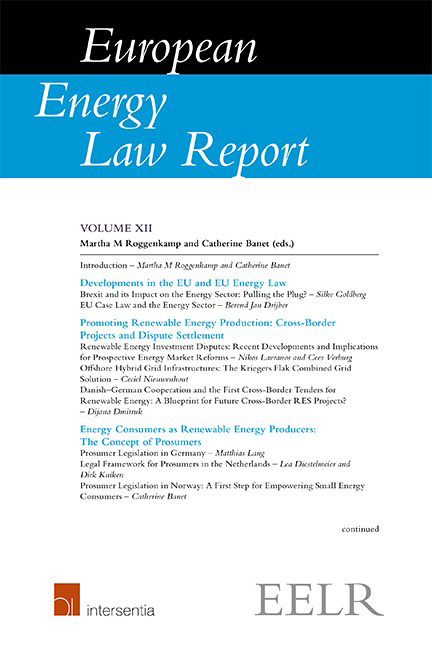Book contents
- Frontmatter
- Preface
- Contents
- List of Abbreviations
- List of Contributors
- Introduction
- PART I Developments In The EU and EU Energy Law
- PART II Promoting Renewable Energy Production: Cross-Border Projects And Dispute Settlement
- PART III Energy Consumers As Renewable Energy Producers: The Concept Of Prosumers
- PART IV Balancing Renewable Electricity Production Withsupply Security: National Experiences With Capacity Mechanisms
- Chapter IX The Capacity Market in Great Britain
- Chapter X Capacity Mechanisms in Germany
- Chapter XI The French Capacity Mechanism
- PART V Promoting The Use Of Sustainable Gas And Security Of Gas Supply
Chapter XI - The French Capacity Mechanism
from PART IV - Balancing Renewable Electricity Production Withsupply Security: National Experiences With Capacity Mechanisms
Published online by Cambridge University Press: 31 January 2019
- Frontmatter
- Preface
- Contents
- List of Abbreviations
- List of Contributors
- Introduction
- PART I Developments In The EU and EU Energy Law
- PART II Promoting Renewable Energy Production: Cross-Border Projects And Dispute Settlement
- PART III Energy Consumers As Renewable Energy Producers: The Concept Of Prosumers
- PART IV Balancing Renewable Electricity Production Withsupply Security: National Experiences With Capacity Mechanisms
- Chapter IX The Capacity Market in Great Britain
- Chapter X Capacity Mechanisms in Germany
- Chapter XI The French Capacity Mechanism
- PART V Promoting The Use Of Sustainable Gas And Security Of Gas Supply
Summary
INTRODUCTION
The need for the adoption of a capacity mechanism in France has primarily been justified by reasons of security of electricity supply. Following a market-based and country-wide approach, the French authorities have made the choice of a Capacity Market as the main capacity remuneration mechanism. The rules for the Capacity Market have been progressively developed since 2010 until the adoption of a detailed regime in 2015. Despite delays related to legal proceedings and the need to rapidly adjust the capacity mechanism design in order to secure State aid approval, the first capacity auction took place in December 2016. This chapter analyses the Capacity Market introduced in France by examining: the evolution of its legislative and regulatory framework and related litigation; its current regime; the modifications induced by the European Commission's decisions on State aid control; and finally an overview of the market practices and some perspectives.
BACKGROUND FOR THE INTRODUCTION OF A CAPACITY MECHANISM IN FRANCE
SECURITY OF SUPPLY AS A PRIMARY CONCERN
The security of the supply of electricity to consumers, which can be defined as: ‘the ability of energy systems to satisfy continuously and at a reasonable cost, the expected market demand’, has been the focus of the French energy transition.
The latter has recently been reaffirmed as part of the ‘Multiannual Energy Programme’ (programmation pluriannuelle de l’énergie, PPE) of 2016 which sets out the Government's energy policy for the next five years, in accordance with the objectives defined in the 2015 Energy Transition Law for Green Growth. The PPE is subject to a revision process in 2018.
Security of supply is a complex issue as a constant balance must be maintained in the network between the production and the consumption of electricity. Additional complicating factors are related to the fact that, on the one hand, electricity cannot be stored in sufficient quantities, and, on the other hand, electricity consumption is variable depending on the time of day and the season.
In France, the main challenge facing security of supply is caused by the winter consumption peak due to consumption that is ‘highly heat sensitive’, given the predominance of electric heating.
- Type
- Chapter
- Information
- European Energy Law Report XII , pp. 231 - 248Publisher: IntersentiaPrint publication year: 2018



